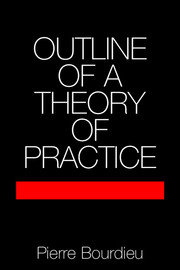1 - THE OBJECTIVE LIMITS OF OBJECTIVISM
Published online by Cambridge University Press: 05 March 2013
Summary
SECTION I: ANALYSES
The practical privilege in which all scientific activity arises never more subtly governs that activity (insofar as science presupposes not only an epistemological break but also a social separation) than when, unrecognised as privilege, it leads to an implicit theory of practice which is the corollary of neglect of the social conditions in which science is possible. The anthropologist's particular relation to the object of his study contains the makings of a theoretical distortion inasmuch as his situation as an observer, excluded from the real play of social activities by the fact that he has no place (except by choice or by way of a game) in the system observed and has no need to make a place for himself there, inclines him to a hermeneutic representation of practices, leading him to reduce all social relations to communicative relations and, more precisely, to decoding operations. Charles Bally remarked that linguistic research takes different directions according to whether it deals with the researcher's mother tongue or with a foreign language, emphasizing in particular the tendency to intellectualism implied in observing language from the standpoint of the listening subject rather than that of the speaking subject, that is, as a “means of action and expression”: “the listener is on the side of the language, it is with the language that he interprets speech”.
- Type
- Chapter
- Information
- Outline of a Theory of Practice , pp. 1 - 71Publisher: Cambridge University PressPrint publication year: 1977
- 5
- Cited by

